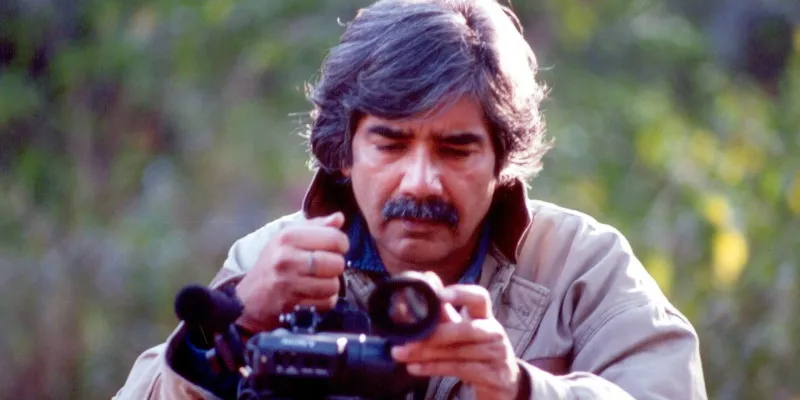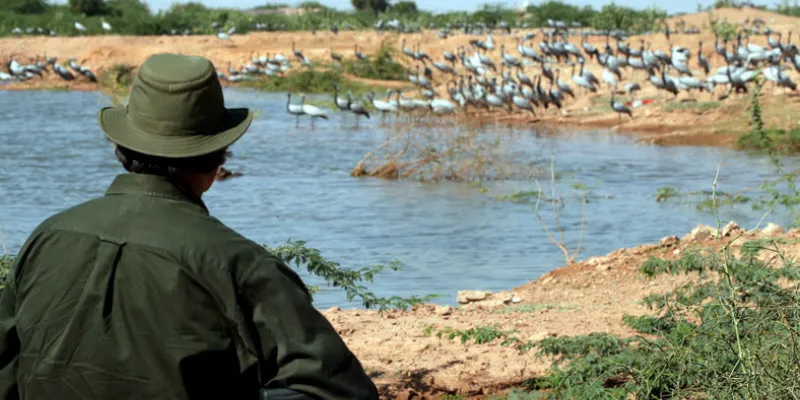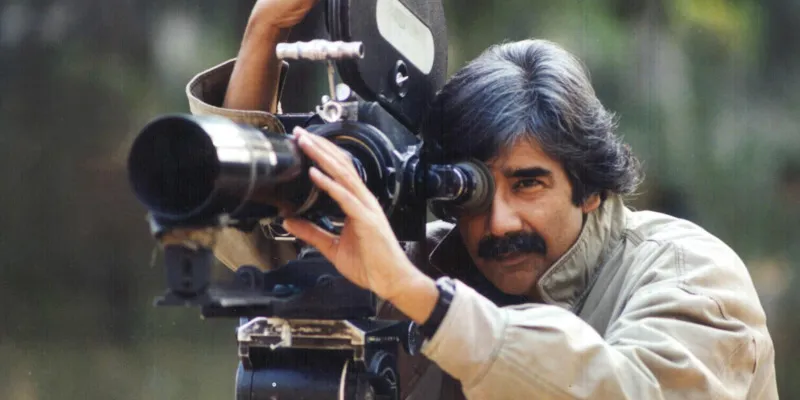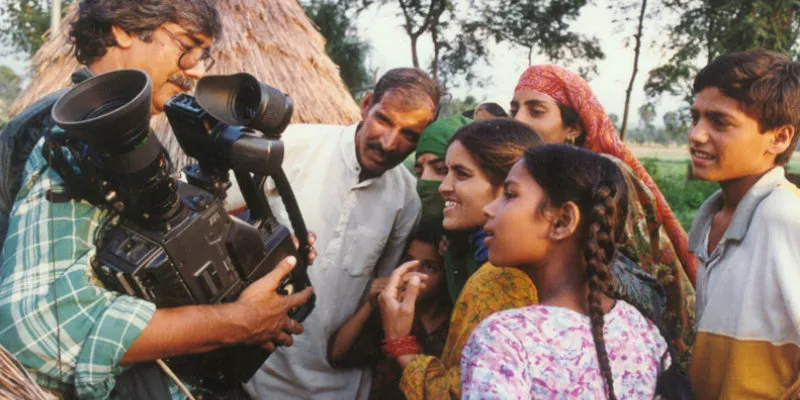“We humans have destroyed this planet and we are the only species who can fix it” - Mike Pandey
Imagine waking up to a python that has made its way into your sleeping bag? Or looking a tiger in the eye a mere two feet away through the lens of your camera?

Meet Mike Pandey, arguably India’s greatest wildlife and environment filmmaker, for whom such experiences are commonplace. Winner of over 300 awards, including the Green Oscars thrice, for his work to spread awareness about biodiversity and species conservation, including helping conserve and protect key species such as whale sharks, elephants, tigers, vultures, and horseshoe crabs.
In 1994, he became the first Asian producer / director to win the Wildscreen Panda Award, also known as the Green Oscar, for his film The Last Migration – Wild Elephant Capture in Surguja.
In 2000, his film Shores of Silence: Whale Sharks in India, won the Green Oscar for the second time. The film also led to the ban on the killing of whale sharks on Indian shores. This film has also won a National Award for Best Film in the ‘Exploration & Adventure’ Category, 2005. On October 2004, he did India proud once again by winning the Green Oscar for the third time for his film Vanishing Giants – a story of his passion and involvement with elephants. This film also led to the ban of cruel and outdated techniques of elephant capture in India.
He is now working on his latest film – The Return of the Tiger, which is supported by Hindi film industry actors, Amitabh Bachchan and John Abraham. On the occasion of World Environment Day, we bring you an interview with India’s most decorated wildlife and environment filmmaker.
If you had to begin with an anecdote from a forest, what would that be?
A: I think when you deal with nature and deal with environment, one of the things that really takes you long way is the word ‘NO’ should not exist in your dictionary, that’s the driving force. Filming in the wild is not like filming in the studio, sometimes you have to wait for hours, days, weeks or even months before you catch a glimpse of an animal or the creature you are looking for. I think it is a specialised field, patience, perseverance and certain amount of dedication, all driven by the passion that you have, are essential ingredients that go towards making good wildlife film maker and ensure that you stay safe in a jungle.
You spoke about patience and perseverance, all of these traits makes you an entrepreneur in that sense. Do you draw a parallel to an entrepreneur’s journey as well to someone who is starting up?
A: I think if you are starting up in this field, you have to learn to respect nature, the subject that you are filming. You have to understand that you are not the supreme commander or the force but you are a part of the web. If you worked yourself around without intruding into nature then learning about the craft, learning about the animals that you are going to pursue, prior knowledge, information, working with subject experts so that you don’t flounder that is the secret that is the key. I think in any film that you make whether it is wildlife or even biopic, your research is the foundation, the greater your research the better you are. The more cameras you have, two three cuts of the same situation, the better storytelling, more engaging. You have to engage people to the ambience around you or the person who is speaking. I think that’s what goes towards making a more engaging and meaningful film.
If you have to look back in your journey, how did it all begin?
A: I think it was a lot to do with my parents and the values that I got when I was very young and my brother. I was born in east Africa, near the National Park the backyard literally was our home. In the evenings, we used to hear elephants calling out and lions calling out to each other from our place called Machakos. Later on, we switched closer to Nairobi, but even there, was a National Park right next to our house. The values we acquired there, every evening my dad used to take us for a long spin in the jungle, that’s where the love and the intimacy with nature began, there was a lot of respect and reverence. We were taught not to be afraid of animals because they have their own world and own space they like to live in the jungles, while we lived in our own homes and what I call concrete jungles. However, there was a balance and equilibrium, which was so important, leave them alone and they will leave you alone. The world of wild animals and of nature is a world of wonders, not everybody has exposure to jungles and to the way animals live, which was what intrigued me the most.
Right from a very young age, I started filming photographing, registering, capturing images and coming home, showing my pictures and telling the story, that’s where it began. I think interest developed into a hobby and photography became the hobby and then later on, it became a profession. It all worked out well in the end, I am a glad I have been able to do some work that has been a voice to animals, spoken for them. Animals cannot come and protest but there are people and I hope there will be many more people, who will stand up and fight for the right of the animals that we share this planet with. This planet does not belong to us, we share it with millions of other species on this planet. We are what, 80 thousand years maybe on this planet, what about other creature that have been millions and millions of years and we must learn to respect them. Today if you look around yourself, the world, the earth is in a crisis there is a turmoil, everyone is talking about climate change. This is a direct result of human activities, maybe we did not understand nature may be out of ignorance or maybe also out of greed for more. We have disturbed the equilibrium the balance and climate change, global warming is a direct result and humanity is paying a price. All the erratic weather you see untimely rain, these are matters of great concern and there is no magic wand to put it right. We have destroyed the planet’s system and fortunately, we are the only species on this planet that has the ability to reverse the damage, question is are we ready? If we are not then we will wipe ourselves out as well.

How do we really reverse it?
A: I think lifestyles need to change. Look at our water resource that’s the most valuable resource on the planet, its being misused its been wasted there is no respect for it. In any religion in the world if you look, water is respected and people venerate it. But when it comes to using, you see taps, you see the way cars are being washed today when there is so much scarcity of water. I think we have to learn how to live in a balanced way there has to be an equilibrium. You go out to a restaurant you order as much as you want, when you are thirsty why fill up the glass and then take only a sip and leave the rest, just take half a glass if need more fill it up again. Unless every single one of us learn to conserve and be minimal, we will not be able to restore the planet and there is a need to restore the planet that we need to understand.
Three Green Oscars and amazing body of work behind it. If we have to talk about some of the challenges of documentary film making in your journey, what would that be? Most pressing challenges that you faced in the country?
A: Challenges that I faced in the country are many, I left England to come and work in India, settle down here. I asked for trouble because every step there is a wall a bureaucratic red tape or a wall. Nowhere in the world are there rules and regulations, which are as archaic as in India. We need to conserve our wildlife and to conserve our wildlife, does not mean me alone or the government alone. The government has laws, rules and regulations, but the Tiger is still being killed. Unless we sensitise the people, unless we make them understand why it is important to save and protect the Tiger, what value does it have for us, the Tiger will not be protected it will die it will be wiped out, you will find them only in zoos.
Habitat loss is happening all over, so how many protest have you seen. Jungles are being cut, about 4000 hectares of land got burnt in Uttarakhand, nobody knew. Three months the fire was blazing, 1268 fires and there was no report in the papers nowhere, we didn’t hear anything from the government. Only in the last two weeks or three weeks when the report came, the army moved in and ofcourse the fires were extinguished. There are satellites there are monitoring agencies but it shows that there is something wrong in this system, in the management. Lot of people say corruption, I’d say nexus of government agencies along with bureaucratic tangles. Whatever the reasons we lost the jungles, animals have lost their homes. Losing 4,000 hectares is a serious issue especially in the hill areas, because forest provide moisture and water which we require for sustenance, streams are going to dry out how will the farmers farm. We can only harness 12 % of all the rain that falls on the planet, in India the rest is wasted goes into the gutters, into the rivers, into the sea. There is a great need for us to pull up our socks understand that man cannot survive in isolation. We need to work together at all the levels at the extreme grass-root sensitise and generate awareness, educate our people, for the bureaucrats to look at the bigger picture. Unfortunately there is a malaise, an ailment, whoever is in the seat of power thinks he owns it its his fiefdom and he holds on dearly, he may not have the capacity to protect but he will not let you protect. I remember our former Prime Minister saying in an interview I had with him, that the trouble with India is the powers will not do what needs to be done. If somebody else comes to do it they will not let him do it, that needs to get away, we need to grow out of our schoolboy pants especially the bureaucracy. Everywhere they should smoothen the passage but they create millstones and walls. We are a country the only nation in the world which worships rivers, my question is simply this, for over 20 years you’ve been trying to clean the Yamuna and Ganges, you call it a mother, is this how you treat your mother?
How do we, at our level, sensitise people, because that is also been an issue?
A: I think India needs education, if we educate our people then there will be informed choices and we will then elect leaders who are intelligent. We need science, we need education, we don’t need people who don’t even know how to write a single sentence correctly, where will they lead the country to. We need good governance, good leadership. It is tragic that a county like India where nature has been always considered supreme, that we have lost such huge amount of forests. Lot of famines and droughts are happening because of loss of natural moisture. We have some of the most ancient jungles in the world the Western Ghats for example, they are under threat of mining lobby and ofcourse clearing for farms. Who is going to inform the people that over 360 rivers flow out of the forests of the Western Ghats. 300 to 400 million people, their lives depends on those forests for water, for moisture, the longest waterfall the Jog falls in Southern India. Cut the Western Ghats and the rivers will dry. We need the environment if we are to survive, if we have to have a sustainable future that is very important. You are alive because of water, because of air, because of natural resources, so how can you just erode them and not even think about them. You wouldn’t be here without your mother, your mother sustained you gave you birth, the same way the earth is a mother of all mothers. If it becomes weak and starts dying life on this planet will finish it will be wiped out. This is the time for every single one of us, the planet is our home it does not belong to any government it belongs to all of us, we have to nurture it the way we nurture our mother or look after her.

If you have to talk about some of the films or some of the initiatives that you guys are at Riverbank studios at the moment, which would that be?
A: Riverbank Studios makes films about endangered species and animals that are endangered. Unfortunately, there are no support systems, we have a team who put their shoulders, their minds and hearts and we produce films, which never sell, but that is not the objective.The idea is to speak out for animals and ensure there is legislation, then reach out into the grass-root levels and sensitise them, as to why and what is the link between a creature and their lives. For example we did a film on vanishing vultures, 79 million vultures have died in the last 10 – 15 years. All killed because someone imported a lethal drug called diclofenac, it created a lot of crystallisation in the kidneys of the vulture, gave it to his gout and it died in three days’ time. The Prime Minister gave a directive, but no one listened, and he said you must discontinue this within 6 months but no one listened. After two years, I read an article saying that ‘Vultures towards a tailspin to extinction’. I went out in my jeep all around 6000 – 7000 kilometres, I saw only 28 – 30 vultures and we had seen thousands earlier. We made a film called ‘The Broken Wings – Vanishing Vultures’. I am glad to say within three weeks it became a parliament question, there was a great move and the production of Diclofenac was banned and prohibited all over India. All the stocks were destroyed, because there was a viable and a safer substitute, Meloxicam, it literally saved the vulture from extinction. Similarly, for two years I wanted to make a film on Whale Sharks, saying that they have been killed in our country, they should not be killed, and nobody listened. We struggled for about 2 and 2 ½ years asking for permission or funding but there was none available. Finally, we decided to make it on our own, it took us 2 ½ years. We showed the world, which did not believe that Whale Sharks existed in India and no Indians, believed that Whale Sharks existed here. We were killing around 1,200 Whale sharks in si weeks and the meat was being sold by the fishing mafia, by the fishermen by Rs.1 per kilo and by the mafia for $60 – $100 per kilo. However, the film brought a ban, legislation under Wildlife Act 1972 for the first time for a marine species. That was our reward and I think it was very satisfying to see that, a film has been effective in bringing about a change. Making the film and getting legislation alone was not enough. Our team, volunteers, and people like you, we all got together and took the films to each fishing village. there were about 272 or 278 villages. We showed the film multiple times and had talks and lectures and heard that 19 fishermen had died fishing for the Whale shark. Because we are not a whaling nation, we are not a deep sea fishing nation and in accidents 19 people lost their lives. Each fisherman who was involved used to get about Rs. 700 to Rs. 800 per day, for that amount how can a life be lost, how can a family become headless. We reached and touched the minds and hearts of people. Why destroy a very crucial link of the food chain for just Rs. 700 and this fish is a great stabiliser of the oxygen content and mitigating carbon from the atmosphere, that was a helpful for us. The Whale Shark was undoubtedly one of the good films that was effective not only nationally but also globally. It helped to bring conversation globally. The film became a catalyst, effective in bringing the world community together, showing them what is actually happening and that brought global conservation. Even today as the Time Magazine says, it was the most powerful conservation film in the world, it saved a species from extinction and for an Indian film to do that is a matter of great pride for us, which shows us that we do care for nature and we are doing our bit. But there is need for more, my appeal would be to anybody who is listening or reading, please take the first step, come and help. Nature is supreme, forests are the greatest natural resource in the world and our lives depends on that. They give us water they give us food they remove the poisonous carbon from the system, they purify our water and we have to learn to respect natural resource, without that there can be no life on the planet.
To all the youngsters, who are listening to you at the moment, a lot of them would want to take the initiative and follow your footsteps. But a lot of them take a step back because of the commercial viability of documentary film making. What would your advice be to them?
A: Wildlife filmmaking, making films on nature and environment, in India specially is one of the toughest calls. Its very difficult, there are no supporters, there is no support from the corporate world, which there should be. Documentaries are basically educational tools. When you go to a school or a college and deliver a lecture or two 500, 1000 people 2000 people will hear and listen and these are words floating in the air. But when you make a film about the same subject and illustrate it with visuals, it can reach on a television network, upto 800 million people and on a social media even a billion or 2 billion people. It has long shelf life you can recall it whenever you want, so you can reinforce the idea.
You need to tell your story in the most effective way in the shortest time and that can be done through documentaries. My appeal, first is for the government to wake up to the importance of the role documentaries play and will play in education. Not just documentaries, visual content, schools of the future will come on the tablet on television on your mobile sets, we have to be prepared for that.
In a country like India, where many people are still without information and education, who live out there and not in the cities constitutes over 67% of our population. The simplest, fastest and easiest way to get them is through the public broadcaster and that can empower India. Education is key if we are to succeed and become a super power or grow up get rid of poverty or our ailments, diseases, sickness, that is very important. Documentaries play that role, documentaries have to be revived, they have to be understood. Out of the 800 – 1100 channels today, how many documentary channels do we see? The responsibility of television owners is also that of taking valuable education content to the people.

In the recent past have you seen initiatives from the government that would, you think, would make a difference in the current scenario?
A: The government may have good intentions but I do not see it translating at the ground level. Environmental challenges are a global concern today and we should do something on a war footing, especially to do with reverence about water. Even in Shillong, I saw tankers taking water to Cherrapunji, the wettest place in the planet. What could be more drastic than that and dangerous? What are we waiting for now? We have to have a national mission in conservation of water, every home every citizen should workout.
Unfortunately, in ignorance, in connivance, in corruption and some in greed, our water bodies are being taken over and colonies are being built over them. What happens when that happens, when you take over cashment areas and build colonies? What happened in Chennai is a classic example, huge population of people were moved into houses that we built in a cashment area in a flood plain. Houses been built on the flood plains of Yamuna, if an earthquake takes place here, will have what is called liquefaction. Liquefaction is so dangerous that even 8 – 10 story building will sink right in, the earth will turn into mud. Nearly 60% – 80% of Delhi will be destroyed, in a Seismic Zone 4 earthquake of 7.8 intensity. Are we prepared for it? Have we been warned? That’s what I am saying we need to educate our people, prepare for emergencies and inform them, otherwise there will be chaos.
There is need for education, there is a need to respect the environment and there is a need for an equilibrium for a balance in our lives. In anything we do, whether it is food or how we move around in the cities or we use natural resources, that is the only way that will give us all a future, a sustainable future, and we will be able to look forward to a tomorrow.
Photo Courtesy : Riverbanks Studios







